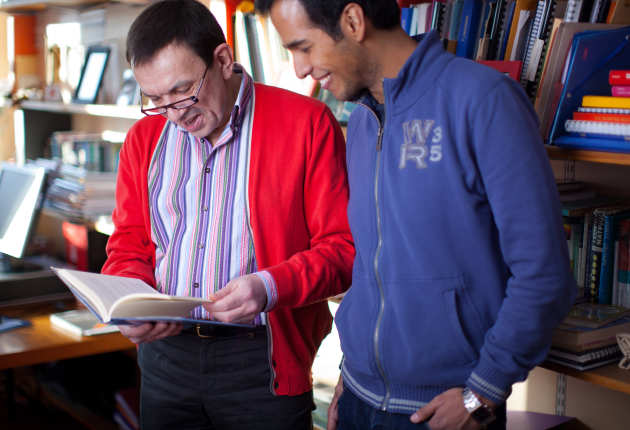 The Department of Mathematics at Imperial College London is an internationally renowned department within one of the world's most prestigious universities. The principal aims of the Department are to train professional mathematicians to pursue the study of abstract, scientific and technological problems by mathematical methods, and to undertake research in various branches of the subject.
The Department of Mathematics at Imperial College London is an internationally renowned department within one of the world's most prestigious universities. The principal aims of the Department are to train professional mathematicians to pursue the study of abstract, scientific and technological problems by mathematical methods, and to undertake research in various branches of the subject.
The Imperial Mathematics Department is divided into four sections: Pure Mathematics, Applied Mathematics & Mathematical Physics, Statistics, and Mathematical Finance. The last is mainly involved in post-graduate work, but the first three sections offer a vast number of modules for undergraduate study. The range of mathematical interests in the Department is very wide, and staff engage in both teaching and research. There are approximately 80 academic staff including 40 Professors; some 70 Research Associates/Fellows, a number of eminent Emeritus Professors and Senior Research Investigators, and frequent international visitors, all contributing to the vibrant research and teaching environment of the Department.
With over 800 undergraduates undertaking a broad range of BSc and MSci courses, 200 MSc students and 150 PhD students, the Department is one of the largest in the UK.
Over 30 nationalities are represented in our Undergraduate student body. Coming from a number of academic backgrounds, A-level, IB, and other international educational programmes, all of our admitted students will have in common their excellent mathematical scores from their previous schools. We look forward to welcoming each incoming class, students learning from each other, sharing in their diversity, knowledge and experiences.
 Starting from the first year, students will study under top researchers, and also take part in small research projects of their own. Additionally, studying at Imperial, students will be immersed in a centre of scientific research and be able to attend public lectures and events taking place across the campus, further expanding their knowledge and solidifying the importance of their subject area in the world today.
Starting from the first year, students will study under top researchers, and also take part in small research projects of their own. Additionally, studying at Imperial, students will be immersed in a centre of scientific research and be able to attend public lectures and events taking place across the campus, further expanding their knowledge and solidifying the importance of their subject area in the world today.
The Mathematics undergraduate programmes at Imperial generally provide a broad introduction to the major areas of Mathematics and then allow you to specialise in the areas that interest you most. The Department offers various BSc (3 year) and MSci (4 year) undergraduate degrees, as well as postgraduate MSc programmes. There are also Joint Mathematics and Computing degrees, administered by the Computing department.
The programme for your first year and a large part of your second year consists of core material that we regard as an essential foundation for further study. You will start specialising in your second year through optional modules, and in your third year you have a free choice from a wide range of topics: currently students choose eight from over forty optional modules - one of the widest selections in the UK, if not the world. Modules may change slightly depending on the year, but some that have been on offer in the past include: Mathematical Finance: An Introduction to Option Pricing; Dynamical Systems; Methods for Data Science; Special Relativity and Electromagnetism; Stochastic Simulation; Algebraic Combinatorics; Geometry of Curves and Surfaces; amongst many others.
If you continue for a fourth year (MSci), you can increase your specialization, or broaden your scope. For MSci students, a quarter of the final year studies will be devoted to the independent project. This project allows you to concentrate on one specific field of interest, producing a lengthy piece of work on your research at the end of the year. If you are interested in continuing in academia, the project allows a perfect opportunity to see what independent research is like and also provides you good evidence of your skills and interests to share for PhD applications.
The Year Abroad programme enables you to combine the development of your mathematical skills with the experience of studying for a year at a university in another country. The degree takes four years to complete, your third year being spent in one of our partner institutions. This is an excellent opportunity to broaden your horizons, providing you with marketable skills both with the language knowledge and experience gained by living and studying abroad.
You can read testimonials of what some of our alumni have gone on to do on the Alumni pages.
The joint programmes provide the student with a firm foundation in both Mathematics and Computing Science, as the title suggests. For more information about the Joint Programme, please visit the Computing Department.
You can find out more about the programme and the application process on the College prospectus pages.
Terms and conditions
Important information that you need to be aware of both prior to becoming a student, and during your studies at Imperial: